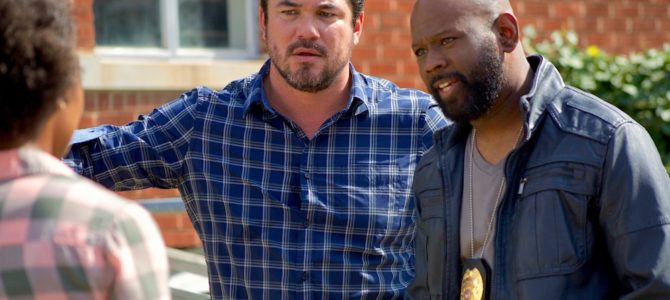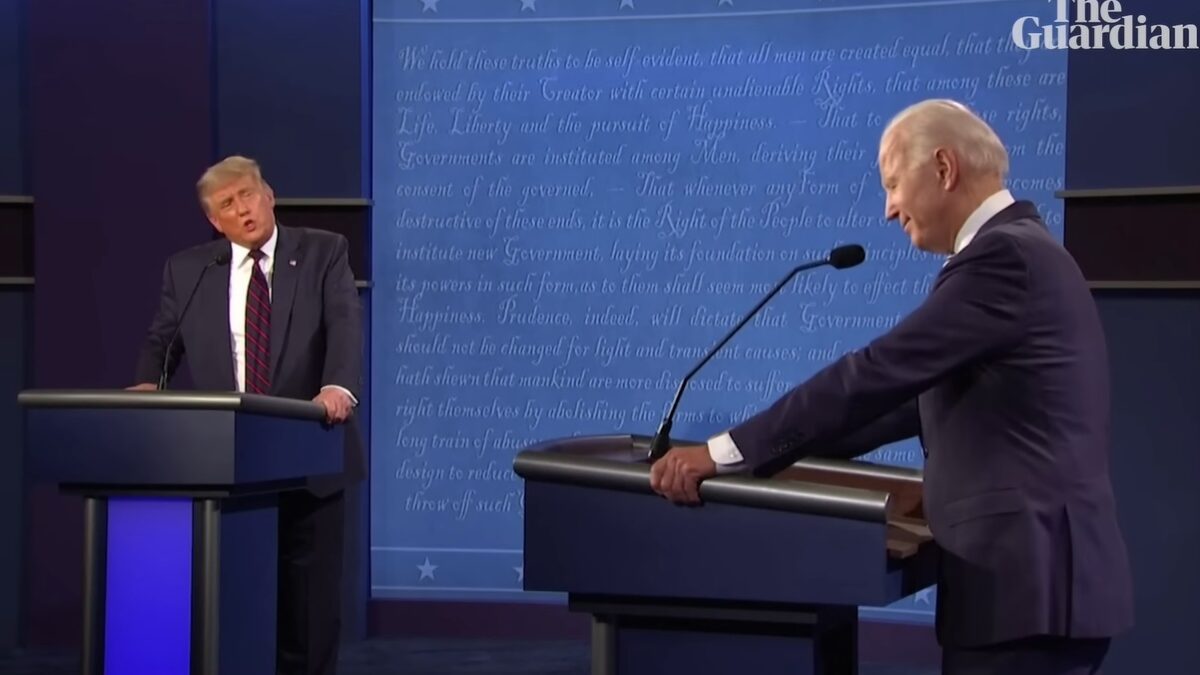
“Gosnell: The Trial of America’s Biggest Serial Killer” has traversed a far longer road to release than its producers ever expected. The true crime drama follows a Philadelphia narcotics investigator (Dean Cain) who stumbles upon a serial killer operating near the local university.
Nick Searcy, whose decades of acting roles include this year’s Academy Award winner “The Shape of Water,” directs the feature film also starring Sarah Jane Morris (“Coyote Ugly”) and Earl Billings (“Con Air”). “Gosnell” will open in theaters on October 12.
This impressive roster belies the challenges this production has faced since it started in 2013. An initial crowdfunding campaign was yanked due to the subject matter. Some actors walked from the project. When producers compiled their research on the case as a book, The New York Times refused to rank it as a bestseller.
Once the producers shopped the finished movie around Hollywood, distributors were cagey. “Each one would say: ‘Great, important film—just too controversial for us,’” says producer Phelim McAleer in a phone interview. “It’s been one thing after another.”
They finally secured a national release last year. Then, in a move the media called “highly unusual,” the Philadelphia judge on the case sued them to stop its release. “All we can say about that is that it was resolved,” producer Ann McElhinney tells The Federalist. “Unfortunately, that’s all we can say.”
Their own investigation, and now dramatization, of the case speaks for itself—including why so many in power don’t want this story to be made public.
True Crime, Appalling Horrors
In 2010, as the opioid crisis was accelerating, reports surfaced of a Philadelphia abortion provider selling prescriptions for narcotics to drug dealers. A task force of Drug Enforcement Administration agents and local cops soon conducted a raid.
“They went in on a drug warrant, and found out much more was going on,” says McAleer, a veteran journalist. “Dead bodies were coming out of this clinic. Women were being maimed and complaints were being made. Yet he was very respectable, upper middle class. America’s biggest serial killer operated in plain sight.”
In 2013, a jury convicted Kermit Gosnell of three murders and more than 200 counts of violating state abortion laws. Among his victims was 41-year-old Karnamaya Mongar, a refugee from Nepal who came to his clinic for an abortion.
She died of a drug overdose administered by unlicensed workers. Prosecutors revealed that Gosnell specialized in partial-birth abortion, a procedure banned by a 2003 federal law (later upheld by the U.S. Supreme Court). Gosnell is currently serving three consecutive life sentences in a state prison.
“The bureaucrats were told from higher-ups that abortion clinics were ‘sacred spaces,’” recalls McAleer. “They couldn’t be touched. This originally started with Governor Tom Ridge, who ran as a pro-choice Republican. He stopped the inspections of abortion clinics and the Democrats just continued that policy.”
The political role reversal was one of several factors that made the Irish journalist, previously a writer for The Economist and The Financial Times, curious enough to book a trip to see the Philadelphia case unfold.
“When I went into the courtroom, I saw horrendous photographs and evidence,” he continues. “But the most shocking thing of all was when I looked behind me and saw the empty press benches. In modern-day America, so crime-obsessed, this was somehow a non-story?”
His partner McElhinney finishes the thought. “This is exactly what journalists are meant to get excited about covering,” she says. “But we had crickets in the press.” When columnist Kirsten Powers wrote in USA Today on Gosnell, some outlets were shamed into covering his crimes against humanity. Then the story quickly faded.
Why No Interest In A Salacious Story?
In recent years, true-crime drama has become a hub of cultural buzz. Top-rated FX anthology series “American Crime Story” exemplifies the trend. Over two seasons, it has dramatized the investigations of crime suspect O.J. Simpson and murder victim Gianni Versace, diving deep into their trials, both personal and in the courtroom.
Scripted and documentary crime dramas have proven ideal for Netflix. After “Making a Murderer” became a binge-watching obsession in 2016, several shows such as “Mindhunter” and “The Staircase” soon followed.
On the big screen, director Quentin Tarantino has cast Leonardo DiCaprio and Brad Pitt in his take on infamous serial killer Charles Manson. Tarantino’s “Once Upon a Time in Hollywood” is currently filming near Los Angeles.
Hallmarks of the genre are on display in the Gosnell case, notably how many local players turned a blind eye to his crimes. “Insurance companies knew, lawyers knew, politicians knew, bureaucrats knew, even some police officers knew,” says McAleer. “You have a political and media cover-up on multiple levels over decades.”
McAleer and McElhinney became documentary filmmakers in the past decade. Their successful films have explored controversies surrounding hydraulic fracking, environmental activism and other hot-button topics.
Initially, McAleer couldn’t sell his partner on making their next film a crime drama, especially about abortion. The subject matter was too offputting for her. Then boxes of trial transcripts arrived at their production office. “We started reading them, and it was a very swift conversion,” says McElhinney.
“The actual stories of the children who died in that clinic are shocking,” she continues. “The testimony of witnesses to what went on there is horrific. Then the Department of Health hadn’t inspected the clinic in 17 years, despite the fact that two women had died? It’s the kind of stuff you can’t even begin to believe.”
They had a compelling story. But could their project make it through production?
Their Unexpected Challenges
Since their past films were funded via Kickstarter, the producers planned to once again use the popular crowdfunding platform. They submitted their campaign to Kickstarter and days passed, despite the site’s 48-hour commitment to respond.
“It really screwed us up,” says McAleer, recalling the long wait. “When we pressed them, they said our campaign offends Kickstarter’s community values.” McElhinney elaborates: “They wanted everything about the story out,” she says. “This doctor was convicted of murdering and stabbing babies. Yet they wanted those facts out. It didn’t make sense.”
Their campaign moved to Indiegogo and raised more than $2 million in 45 days, setting a new record for the site. The producers got to work interviewing involved law enforcement officers, witnesses, jury members, and even Gosnell himself. They brought on screenwriter Andrew Klavan, producer of the Clint Eastwood-directed “True Crime,” among other films, to write the script.
“Much of the film, including the trial evidence, is verbatim and directly from the actual transcripts and interviews,” McAleer says.
Known for his lead role on FX’s “Justified,” Searcy soon signed on as director. Dean Cain, star of the 1990’s show “Lois & Clark: The New Adventures of Superman,” was enthusiastic about the story. He met his real-life counterpart when detective Jim Woods visited the movie set. Assistant district attorney Christine Wechsler, portrayed by Sarah Jane Morris, also saw the work in progress.

Smaller roles were harder to lock down. “We had a few actors on-board, and they seemed all for it,” says McAleer. “But they came under pressure from leftist Hollywood that they shouldn’t do this film. Hollywood is a community that’s supposed to value controversy, but they didn’t want to promote what they saw as a different ideology.”
“Really what they didn’t want is the truth.”
The Great Divide in American Politics
McElhinney recalls a telling conversation from five years ago, at the start of the “Gosnell” project. “Someone pulled me aside and said, ‘You think you’ve seen controversy and angry people before? You ain’t seen nothing until you touch this issue.’ It’s true, we’ve never experienced this kind of hostility.”
Gallup reports Americans are evenly split on the issue of abortion laws. A Daily Beast columnist contends that, “Every political fight will eventually be an abortion fight.” The filmmakers believe a lack of knowledge plays into this great divide.
“One of the things we’ve learned through doing this is how little people know about abortion,” said McElhinney on The Federalist Radio Hour last year. “It’s actually a compliment to Planned Parenthood. They’re very clever. They’ve managed to do a thing where no one in America knows the laws on abortion. Even very few pro-life people know that you can have an abortion at nine months.”
She compares U.S. abortion policies to those of North Korea and China, for allowing abortions until the babies are born. This statistic was regularly cited — and fact-checked by even the Washington Post as true — during this spring’s debate over the Pain-Capable Unborn Child Protection Act. The law, which passed the House and was rejected by the Senate, would have banned abortions after 20 weeks of fetal development in the womb.
In a recent phone interview, McElhinney notes the two female assistant district attorneys on the Gosnell case: “They are both mothers, both sharp, professional women,” she says. “They did not know the law on abortion in Pennsylvania, which can take place up to six months. All the jury members we spoke to didn’t know either. When they found out, they thought the law should change.”
With another Supreme Court nomination fight consuming Washington this fall, the politics of abortion will once again be front and center. The filmmakers are seeking to cross partisan lines and present a cultural narrative to truth-seekers of all stripes.
“The film I directed @GosnellMovie does not push an agenda,” stated Searcy in a recent series of tweets. “It tells the truth about an event that happened, and allows the audience to make up their own minds about what they think about it.”
“It is neither pro-life nor pro-choice; both sides will enjoy and learn from the film.”
Rated PG-13 for thematic elements, “Gosnell: The Trial of America’s Biggest Serial Killer” will release in theaters nationwide on October 12.









